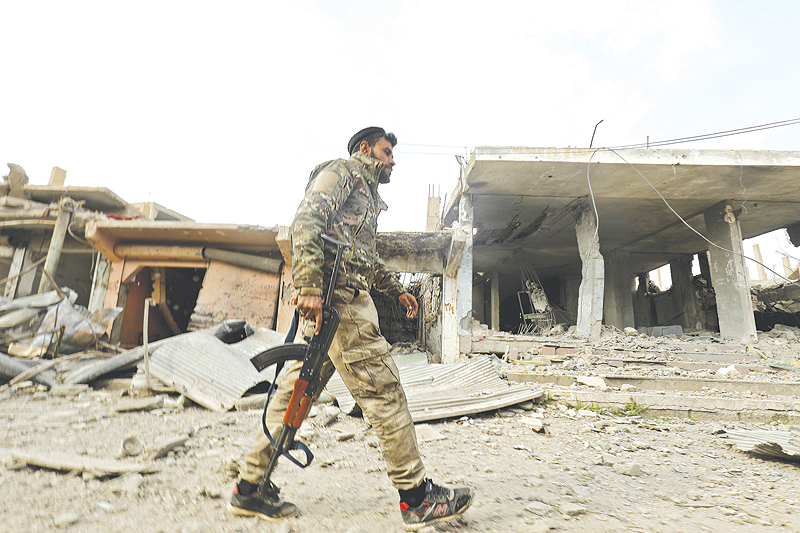Islamists leave troves of documents behind

HAJIN: "The caliphate is here to stay": in the last town it controlled in Syria, the Islamic State group is little more than a slogan on a broken storefront and a dark memory. Hajin has been largely leveled but reminders of jihadist rule remain on those walls that still stand amid the mounds of rubble and mangled construction iron rods. "We did not lie to God when we declared the State," reads another one, spray-painted on a wall in the town that was briefly the "capital" of IS's crumbling empire.
The US-backed Syrian Democratic Forces expelled IS from Hajin in December and have now confined jihadists to a handful of hamlets a few miles down the Euphrates.
Hajin's mayor, Ali Jaber, 56, points towards vacated buildings and houses dotting the sides of the road. "IS used to confiscate people's houses and transform them into headquarters. Every time someone vacated their house, they would seize it," he says.
He singles out an embattled building that has been reduced to a single floor following intensive shelling. The structure, which used to serve as a doctor's clinic, was used by IS as a police base, he says. Nearby, a pile of rubble stands at the entrance of a destroyed house. A resident says jihadists used it as a religious tax office. "Take it with you, we don't want this here anymore," Jaber tells an AFP reporter, pointing to a document listing farming taxes issued by IS's very organized administration.
Copper coins
Further down the road, a set of white chairs are lined up on the sidewalk. Hays Al-Sheikh, 35, a resident, described it as a sort of outdoor cinema. Jihadists broadcast "horror films" there to attract recruits, he says, referring to IS propaganda videos that often included executions and gruesome scenes. Residents point to three utility poles nearby. They claim IS used to hang people from the three columns before stoning or shooting them to death.
Corpses would hang for at least three days, they say. IS converted some homes into makeshift prisons. In one of them, they had sealed off empty rooms with a metal gate and installed bars on each of the windows. The group left troves of documents behind, including lists detailing the names of jihadists, the battalions they belonged to, and the number of their children and wives. SDF fighters have also found military identification cards seized by jihadists following battle, as well as copper coins that IS used as currency.
One SDF fighter pulls out a copper sovereign bearing an inscription at the bottom that reads: "The Islamic State-A caliphate modeled on the doctrine of the Prophet". IS swept across large swathes of Syria and neighboring Iraq in 2014, implementing their brutal interpretation of Islamic law in areas they controlled. At the height of their power, the group's former spokesman vowed to conquer Europe but the jihadists' statehood dreams have been reduced to ashes by relentless offensives.
'It's over'
Standing at the entrance of the main market in Hajin, Shab Turki Al-Ayesh, 48, points towards the second biggest mosque in town. The resident recalls an announcement by an IS leader in the mosque. "He was carrying weapons and ammunition and he was surrounded by bodyguards," he says. "He told us, 'God willing, we will take over the world and in one week's time we will overtake Rome'." Ayesh, who was detained five times by the jihadists, grins: "One week after the announcement we heard that he had escaped to Turkey or Germany."
"I never expected an organization of this size to lose," he says. The SDF is now trying to secure the last patch of Baghouz from IS. Near Baghouz, a village from which SDF forces are poised to launch the final assault on the last shreds of the "caliphate", Sami Abdulhamid sits in the back of a truck waiting to have his fingerprints taken. The 30-year-old Iraqi national, who has recently escaped jihadist territory, says IS is now very weak. "It's over. There's nothing left for them, just one street," he says. - AFP










